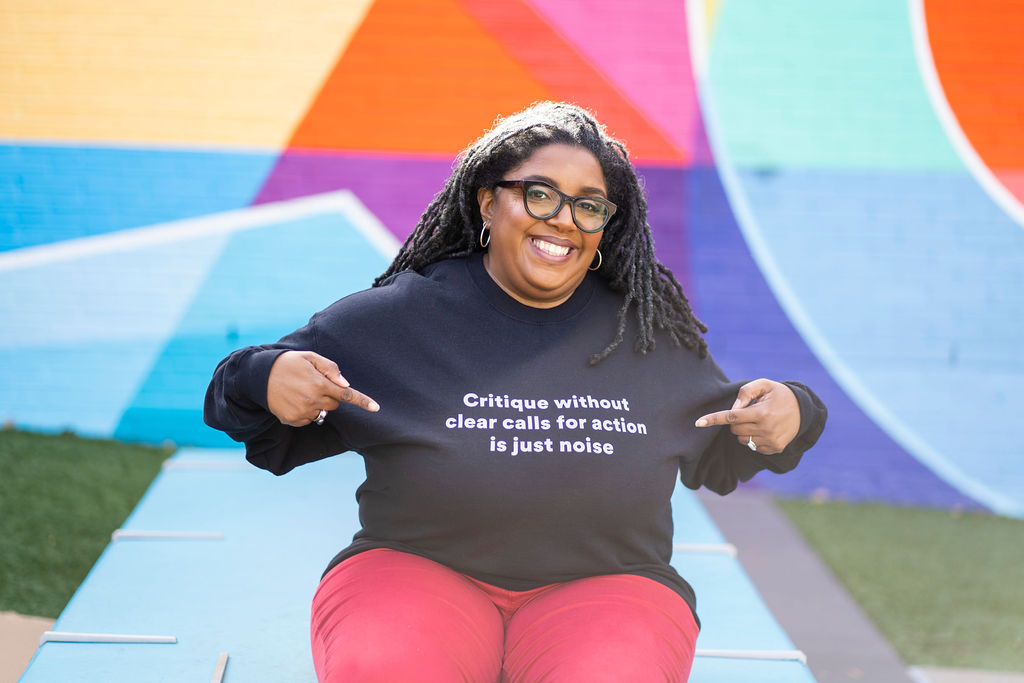Who is Ericka Hines?
If you’ve just stumbled upon Black Women Thriving, you may wonder where it all began and who’s behind it all.
Ericka is a diversity, equity, and inclusion consultant and leadership expert through a professional lens.
On paper, she holds a Juris Doctor from the University of Georgia School Of Law and a B.A. in Political Science from Wright State University.
She is the Principal of Every Level Leadership, where she works directly with organizations that want to make the changes necessary to create inclusive and equitable working environments.
She is also the Black woman who realized that data on what Black women believe they need to thrive in the workplace is non-existent. And without it, workplaces are never going to make the changes needed to allow Black women to thrive, not just survive.
So, Ericka decided to gather it herself! Her passion and drive for this kind of work did not appear out of thin air, though. They have been fostered through a lifetime of advocacy work and a calling to be an advocate for social change.
The Seeds That Grew Into a Lifelong Commitment to Social Change
Ericka’s engine for social change started as a young child.
At the ripe young age of five, she would first watch and then join her mother, a communications worker at the time, on the CWA picket lines.
Holding up signs, encouraging truck drivers to honk in support of a movement she didn’t necessarily understand at that very moment. But she was there, and while the strikes would eventually end, every few years, that fight and flame would reignite, and she’d be ready and waiting to do her part. this passion for social change and equity grew steadily into her formative college years.
Ericka participated in non-violent acts such as art protests on reproductive justice and student rallies against the KKK and apartheid.
Those seeds to make a change only grew bigger in Ericka’s heart as she grew older and recognized the incremental pace at which change was occurring. It frustrated her, and she knew she needed to be part of creating the grand, sweeping change she had always dreamed of.
Graduating from law school led her to Washington DC, where she relished the opportunity to learn more about leadership and social change. This happened through her work in public policy for women’s empowerment and those she encountered along her journey.
Lessons Learned Along the Way
Ericka’s work in public policy taught her many lessons.
One of which is leaders are not just born — they can be built. And that building the capacity of organizations means building the capacity of their individuals.
All of their individuals.
As an advisor, consultant and strategist, she harnesses opportunities for change to create more inclusive and equitable workspaces. Where others see challenges, Ericka sees solutions.
Collective liberation, anti-oppression, and strengthening diversity, equity, and inclusion in the workplace are at the heart of everything Ericka stands for.
After working with more than10,000individuals to help them become more equitable leaders for their teams and organizations, she identified a huge gap. These workspaces weren’t changing so that they could thrive.
And as a passionate researcher and self-proclaimed information curator at heart, she also realized data on thriving in the workplace as a Black woman was scant, at best. She knew in order to create meaningful change in this arena, she would have to generate that data herself.
For the past year and a half, Ericka and her passionate team of Black colleagues have been surveying, analyzing, and deconstructing the circumstances that impact Black women at work.
In her own words,
“While I have seen many workplaces trying to figure out how to become more diverse, more inclusive, and more equitable, they haven’t given much thought to how to help people thrive. Yet, I’ve watched as more organizations have started using the term ”thriving” without an understanding of what it truly means, how it differs from DEI, and no plan for how to create an environment conducive to thriving for anyone, especially for Black, Indigenous, and people of color.
We can’t hope to create workplaces where people thrive if we don’t have a nuanced analysis of the interpersonal bias and systemic inequities they face and what they tell us they need. “
Stay Connected
On June 7, 2022, the Black Women Thriving publication was released and has answers to all of the issues I have described above. Download the free report here.

